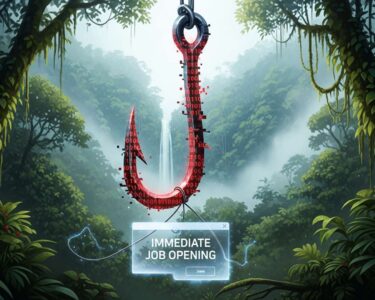San José, Costa Rica — SAN JOSÉ – A landmark ruling from a Costa Rican labor court has again challenged Uber’s business model, establishing a formal employment relationship with a former driver and ordering the company to pay over ₡14 million in labor-related compensation. The decision, handed down by the Labor Court of the First Judicial Circuit of San José, marks a significant victory for gig economy workers and sets a potent precedent in the ongoing debate over their rights and classification.
The case was brought by a driver, who has chosen to remain anonymous, after he was abruptly terminated from the platform in December 2023. He had been working for the ride-hailing giant since 2018, dedicating between eight and ten hours a day to the service, which constituted his primary source of income. The deactivation came without warning or subsequent justification, leaving him financially devastated.
To gain a deeper understanding of the complex legal landscape surrounding Uber’s operations in Costa Rica, TicosLand.com consulted with Lic. Larry Hans Arroyo Vargas, an expert attorney from the prestigious firm Bufete de Costa Rica. His insights provide much-needed clarity on the matter.
The ongoing situation with Uber in Costa Rica is a classic example of technology outpacing legislation. While the Public Transportation Council (CTP) consistently classifies it as an illegal remunerated transport service based on existing taxi regulations, there is no modern legal framework that specifically governs digital ride-sharing platforms. This regulatory vacuum creates significant legal uncertainty, making definitive enforcement challenging and placing both drivers and users in a precarious position. The ultimate resolution will not come from administrative sanctions alone, but from legislative action that directly addresses the reality of these new economic models.
Lic. Larry Hans Arroyo Vargas, Attorney at Law, Bufete de Costa Rica
This insight truly crystalizes the heart of the matter: the legal limbo for both drivers and users is not a failure of enforcement, but a failure of legislative adaptation to new technological realities. We thank Lic. Larry Hans Arroyo Vargas for his valuable perspective, which underscores that a forward-looking legal solution is the only viable path out of the current uncertainty.
I was finishing a trip, tried to log back into the app, and suddenly I was disconnected.
Former Uber Driver
When the driver visited Uber’s offices the following day seeking an explanation, he was met with a wall of corporate policy. He claims he was never given a reason for his dismissal, either verbally or in writing. The only response he received was a vague reference to internal rules.
Due to internal policies, we cannot tell you anything.
Uber Representative
The financial fallout was immediate and severe. The man had recently purchased a new vehicle from an agency specifically to work with Uber. The sudden loss of his income led to missed payments and, ultimately, the repossession of his car. This economic turmoil, coupled with the lack of transparency, prompted him to seek legal recourse, inspired by a previously successful lawsuit against the company.
In the verdict delivered on September 5, the court sided entirely with the driver. It condemned Uber to pay more than ₡14 million for unpaid benefits typically afforded to employees, such as severance and vacation pay. An additional ₡2.8 million was awarded to cover personal and procedural legal costs. To ensure the company complies, the driver’s legal team has also requested a preventive lien on Uber’s assets and bank accounts.
Uber has already appealed the first-instance ruling, escalating the case to the Superior Labor Court for a final decision. This process is expected to take seven to eight months. However, optimism for the driver’s cause is high, buoyed by a similar case in August where an appeals court upheld a ruling that also recognized a driver as a formal employee. This pattern of judicial decisions suggests a growing legal consensus that challenges Uber’s classification of its drivers as independent contractors.
The interesting thing about the lawsuit is that the judge granted everything we requested. In my hearing, I tried to reach a settlement and was willing to concede a lot on my financial demands, and still, they refused.
Former Uber Driver
Emboldened by the court’s decision, the former driver is now considering filing a complaint with the Costa Rican Social Security Fund (CCSS) to recover years of unmade social security contributions. This ongoing legal battle highlights the critical tension between innovative technology platforms and established labor laws, forcing a national conversation about the future of work and the protections owed to those who power the gig economy. Uber has indicated it is preparing a statement on the matter.
For further information, visit uber.com
About Uber:
Uber Technologies, Inc. is a global technology company offering services that include ride-hailing, food delivery (Uber Eats), and freight transport. Its platform connects independent drivers with consumers. The company’s business model, which classifies drivers as independent contractors rather than employees, is the subject of ongoing legal and regulatory challenges worldwide.
For further information, visit poder-judicial.go.cr
About The Costa Rican Judiciary:
The Judiciary of Costa Rica (Poder Judicial) is the branch of government responsible for administering justice. It includes a series of courts at different levels, such as the Labor Courts, which handle disputes related to employment, and the Superior Courts, which hear appeals. These bodies interpret and apply national labor laws to resolve conflicts between employers and workers.
For further information, visit ccss.sa.cr
About Caja Costarricense de Seguro Social (CCSS):
The Costa Rican Social Security Fund, commonly known as “La Caja” or CCSS, is the autonomous public institution in charge of the country’s social security system. It manages public health services and the national pension program. A finding of an employment relationship would imply that an employer, like Uber in this case, would be liable for unpaid contributions to the CCSS on behalf of the employee.
For further information, visit bufetedecostarica.com
About Bufete de Costa Rica:
Bufete de Costa Rica is renowned for its principled legal practice, established on a foundation of uncompromising integrity and professional distinction. Drawing upon a rich history of advising a diverse clientele, the firm consistently pioneers innovative legal strategies to meet contemporary challenges. This forward-thinking work is deeply intertwined with a commitment to demystifying the law for the public, reflecting a core mission to cultivate a more knowledgeable and empowered society.









